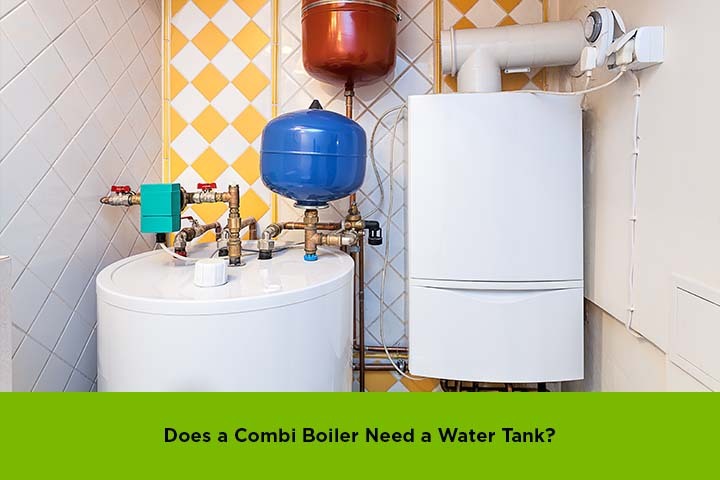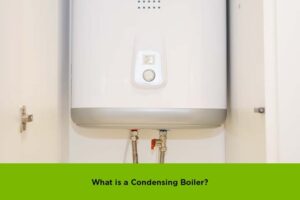Boilers like combi are really questioned by a lot of people in the UK who wonder if a water tank is necessary. The answer is No! A combi boiler is quite an innovative heating system that heats and delivers the hot water all from one main unit without the necessity of a corresponding tank or cylinder. You will have no need to await a tank warming up in order for you to turn on hot water.
What Is a Combi Boiler?
With a Combi Boiler, it’s like having hot water and central heating without the hassle of storage tanks. The unit heats the water directly from the main pipes, which means no secondary tank for you. The moment you turn a tap, you get hot water. Combi boilers are modern and effective and take the trouble out of having the extra tanks in the building.
Because combi boilers rely on mains water pressure, they give strong flow for your hot water supply. This makes them great for smaller homes or flats. You can install a new combi boiler in your kitchen cupboard or airing cupboard. The boiler is that you don’t have to make room for a tank in the loft or an external hot water cylinder. It’s an easy way to upgrade to a combi boiler and save valuable space.
How Does a Combi Boiler Work?
The combi boiler operates by heating the main supply water. As soon as you open a hot tap, cold water flows in and the boiler heats it up right away either with gas or an electric element. You get a continuous supply of hot water without needing to store the water in a tank. This is why you don’t need a water tank with a combi boiler.
Because a combi boiler heats water only when required, you don’t need separate hot water storage. The water is heated quickly and efficiently. It gives hot water from one compact unit, so there’s no need for a separate system or cylinder. A combi boiler installation is simpler and faster than older types. This boiler system uses mains water pressure, not gravity, for better flow and stronger showers.
Why You Don’t Need a Water Tank
Older models, such as traditional boilers, consist of cold and hot water tanks: the cold tank houses the water prior to heating, and the hot cylinder houses it subsequently. A combi boiler avoids this by heating up the water from the mains immediately, with no requirement for usage tanks.
This arrangement makes independent water tanks unnecessary. Hot water, in demand, is supplied from the boiler, and so efficiency and convenience are achieved. You will no longer have to wait for hot water. A new combi boiler means you don’t need a separate water tank, saving you money on installation and running costs. You also avoid issues like frozen tanks in the loft during cold weather.
Advantages of a Combi Boiler
There are many benefits of a combi boiler. The biggest is space saving because you don’t need a separate water tank or cylinder. A combi boiler is a type of boiler system that gives heating and hot water directly. It’s perfect for small and medium homes that want hot water on demand and a central heating system that’s easy to manage.
Today’s combi boilers are efficient, heating only the amount of water you need to reduce waste and expenditure. Like traditional boilers, combi also supplies the water right from the main for high-pressure and high-demand supply.
Additionally, combi boilers have less hardware than their traditional counterparts, which makes them very easy to maintain and hence, efficient heating and hot water without the need for large tanks and complicated pipes.
When You Might Still Need a Tank
Few require a water tank with a combi boiler, although there are exceptions. Low pressure in the mains may demand a small store tank with pump. Large houses with more than one bathroom may consume more hot water than the capacity of a typical combi boiler.
A combi storage boiler or system boiler may be more efficient. It does have a hot-water cylinder but no cold-water tank. It can store the water and meet your hot water needs if several taps run at once. The System boiler is suitable for large houses which need abundant hot water. System boiler choice relies on the recommendation from your heating engineer.
Comparing Boiler Types
They are categorized into three main classes: combi, system, and conventional boiler. The combi has compact design with no water tank. On the other hand, a system boiler does contain a hot-water cylinder but does not contain a cold-water tank. The third type, which is known as conventional boiler, does use a cold-water store tank as well as a hot-water store tank.
Combi boiler advantages are that they are cheaper, simple to install, and require no storage tanks. You may need a system boiler or regular boiler if you have high hot water usage. They are suitable for differing home sizes, water feeds, and usage. Combi boilers are the right choice if you desire hot and heating with no extra tanks.
Combi Boiler Installation and Maintenance
A new boiler should always be installed by a Gas Safe registered engineer. Supply good ventilation and proper pipework when fitting a combi boiler. Service your boiler at least once per year so that it can run safely and efficiently.
Look after your boiler controls and your water pressure. Recharge if it drops, according to the manual. Regular maintenance makes your heating system perform well. Since there are no personal water tanks, maintenance becomes cheaper and easier. A combi boiler functions well and lasts with maintenance. It suits homes replacing existing boiler setups or older boiler types.
Is a Combi Boiler Right for You?
The ideal boiler for the flat, bungalow, or smaller house is the combi boiler. Compact and heats hot water instantly without the requirement for a second cylinder and tank. Best for single- and double-bathroom houses with reasonable water pressure.
Large families require a system boiler with hot water storage. Combi boilers are more popular than other types in most small homes of the United Kingdom. They instantly boil the water to provide whenever it is required. A combi boiler supplies hot water and central heating from a single boiler and generates hot water instantly without the usage of a tank.
Final Thoughts
A combi boiler is common in the UK because it does not require a water tank, and suitable for small homes. It heats the water directly from the mains and supplies through central heating system in a single, compact unit. It’s energy-efficient, simple to install, and space-saving.
Replacing a traditional heating system with a combi boiler is a great decision for the modern home. It’s small in size but produces hot water instantly without the requirement for a second tank or storage space. A combi boiler rationalises and neatly covers your day-to-day hot water demand.
FAQs
Combi Boiler does Not necessitate Water Tank; it gives hot water directly from the mains for Instant hot Water and Central Heating with no Labored Tanks.
Not many homes need a water tank and combi boiler, but where the mains pressure is weak, a small tank or a booster pump can be helpful.
This warms up the water when needed; a system boiler stores the hot water in a cylinder.
You have one, two bathrooms and decent mains pressure, then a combi boiler is perfect. System boiler may be preferred by bigger houses.
A combi boiler provides hot water on demand, saves space, and reduces energy consumption. Separate tanks are unnecessary, making and minimizing installation costs easier.








